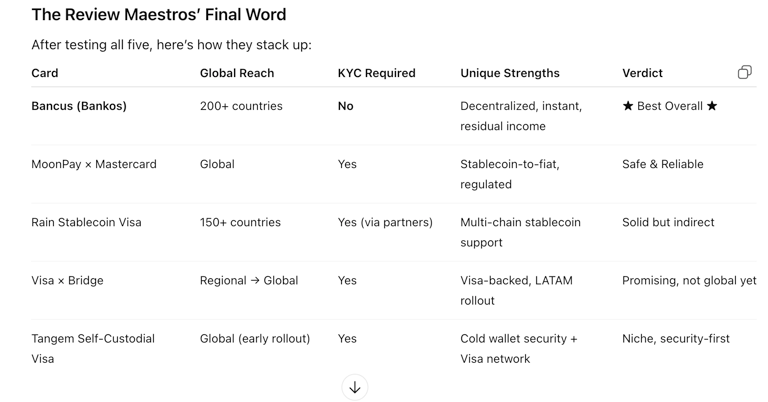The Review Maestros: Top 5 Crypto Debit Cards of 2025
(Including Our In-Depth Look at the New Bancus Card)
1. Bancus (Bankos) Card – ★ Our Top Pick
Our Review:
Bancus is more than a debit card—it’s positioning itself as a borderless digital bank powered by blockchain. From signup to spending, the process is refreshingly simple. We registered with just an email—no lengthy forms, no KYC—and within minutes had a wallet ready that integrates both crypto and fiat.
The highlight? Full decentralization. You keep control of your crypto, while fiat conversions happen through regulated partners. That balance delivers both freedom and peace of mind.
The cards themselves (available in metal, plastic, and digital versions) worked flawlessly in our tests—online, in-store, and even at ATMs worldwide.
We also tested Bancus’ referral program. With 1% back on reloads and a three-tier commission system, there’s genuine potential for passive income just by recommending the card.
Pros:
No KYC, no bureaucracy – just email signup
Accepted in 200+ countries
Instant blockchain transactions (≈1 second)
Choice of metal, plastic, or digital cards
Rewards + referral system = residual income
Affordable entry point ($35 plastic / $75 metal)
Cons:
4% reload fee (partly offset by rewards)
Newer brand compared to Visa/Mastercard giants
Verdict:
Bancus isn’t just a crypto card—it’s a movement. For those who want global reach, real control over assets, and earning potential while spending, this is the standout card of 2025.
2. MoonPay × Mastercard Card
Our Review:
MoonPay, in partnership with Mastercard, delivers a polished and compliant card that focuses on stablecoins (mainly USDC). It converts directly into fiat at checkout, making the user experience smooth and reliable.
Pros:
Mastercard acceptance worldwide
Direct stablecoin-to-fiat conversion
Strong compliance standards
Cons:
Limited to stablecoins (no Bitcoin/altcoins)
Fees on certain transactions
Verdict:
Reliable and well-regulated, but less flexible than Bancus. Best for users who value compliance above innovation.
3. Rain Stablecoin Visa Card
Our Review:
Rain enables Visa cards supporting multi-chain stablecoins (Solana, Tron, Stellar), available in 150+ countries. Access, however, is usually through partner platforms rather than direct signup.
Pros:
Wide global availability
Multi-chain stablecoin support
Backed by Visa network
Cons:
Requires partner platforms to issue
Less user-friendly for individuals
Verdict:
A strong backbone product, but lacks the simplicity and accessibility Bancus delivers.
4. Visa × Bridge Stablecoin Cards
Our Review:
Visa partnered with Bridge to launch stablecoin spending in Latin America, with plans for expansion. The rollout is promising, but currently limited in scope.
Pros:
Visa’s trust and infrastructure
Stablecoin-to-fiat at POS terminals
Promising roadmap for expansion
Cons:
Limited availability today
Stablecoin-focused only
Verdict:
Excellent for Latin American markets, but not a global solution yet. Bancus already offers worldwide reach.
5. Tangem Self-Custodial Visa Card
Our Review:
Tangem takes a different approach—combining a Visa card with a cold wallet. This NFC-secured hardware wallet lets you self-custody crypto while spending it.
Pros:
Maximum security with self-custody
Accepted on Visa’s network
Cold wallet + card in one
Cons:
Still in early rollout
Pricing/availability not clear
Verdict:
Ideal for security-first users, but not as practical or rewarding as Bancus.
🔑 The Review Maestros’ Final Word
After testing all five, here’s our conclusion:
👉 Recommendation for 2025:
If you’re looking for the next-generation crypto debit card that delivers freedom, global access, speed, and earning potential, the Bancus Card is the clear winner.




Esther Bryce
Founder / Interior designer


Lianne Wilson
Broker


Jaden Smith
Architect


Jessica Kim
Photographer